外研版(2019)必修 第三册Unit 1 Knowing me, Knowing you Using language公开课课件(共40张PPT)
文档属性
| 名称 | 外研版(2019)必修 第三册Unit 1 Knowing me, Knowing you Using language公开课课件(共40张PPT) | 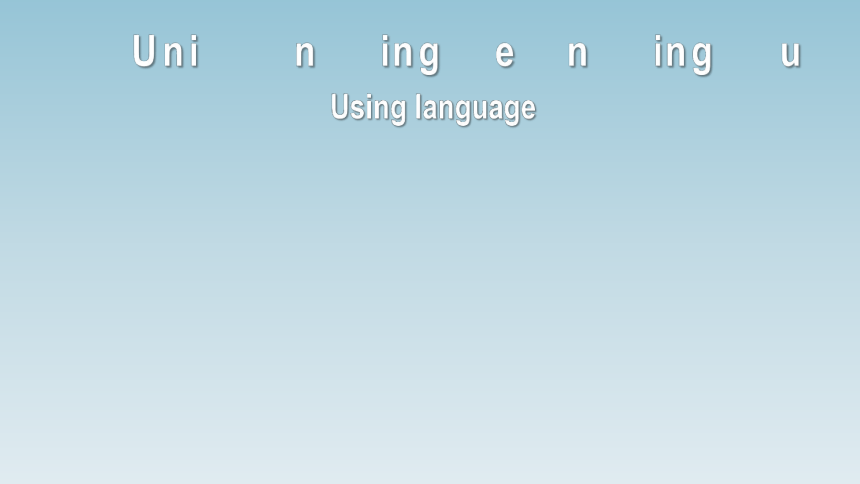 | |
| 格式 | pptx | ||
| 文件大小 | 1.1MB | ||
| 资源类型 | 教案 | ||
| 版本资源 | 外研版(2019) | ||
| 科目 | 英语 | ||
| 更新时间 | 2023-02-28 15:42:30 | ||
图片预览

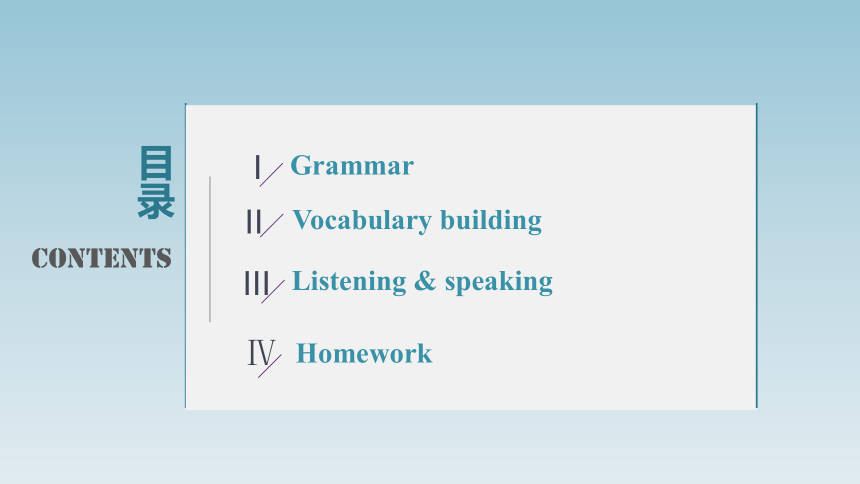
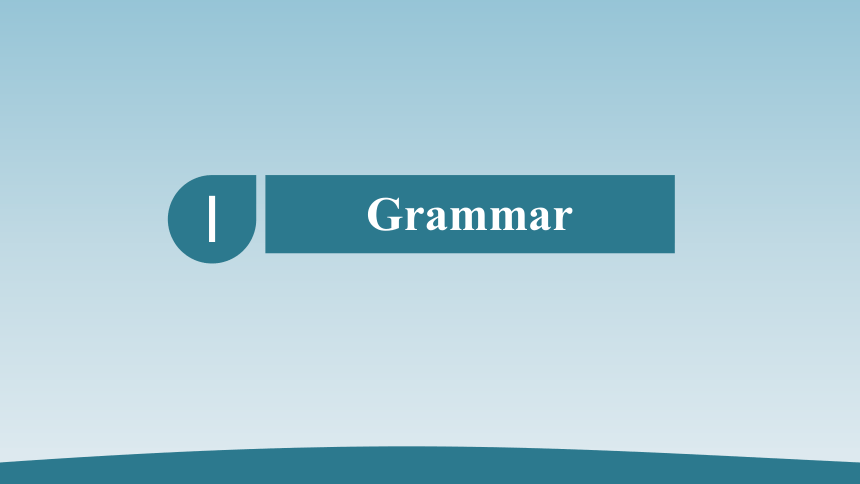
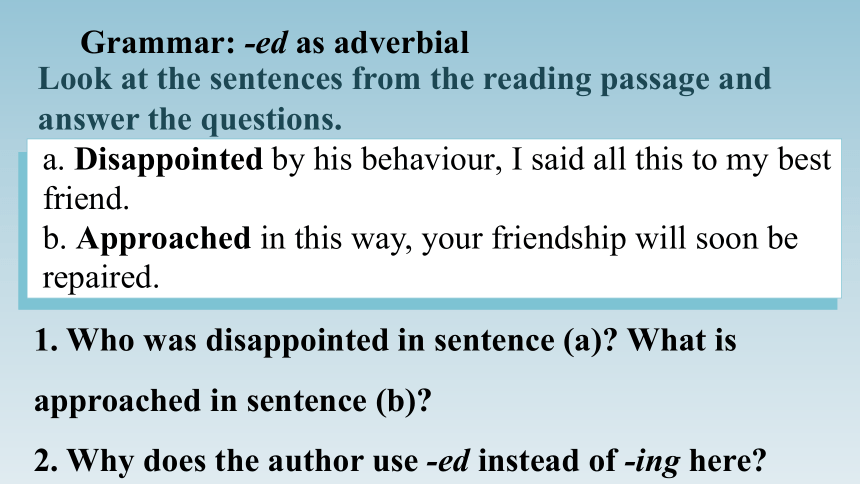
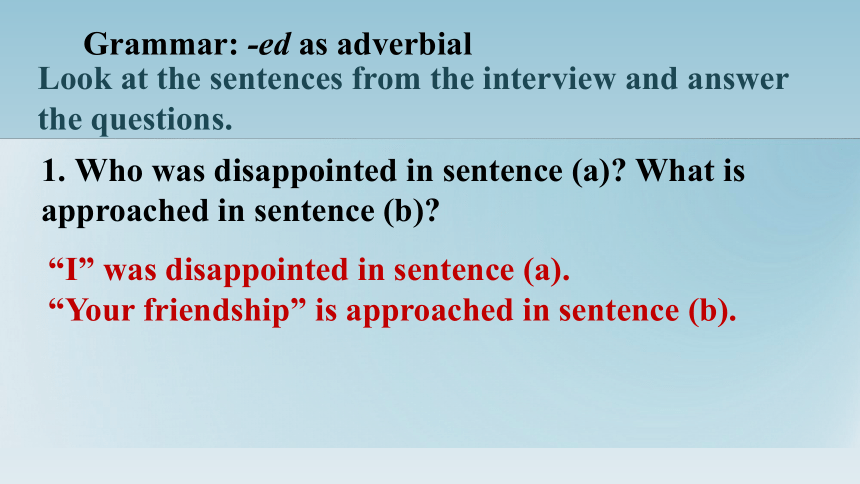
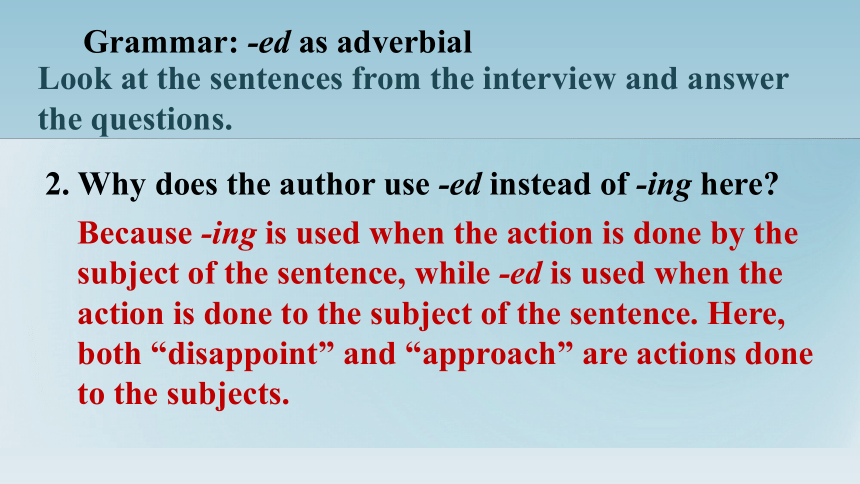
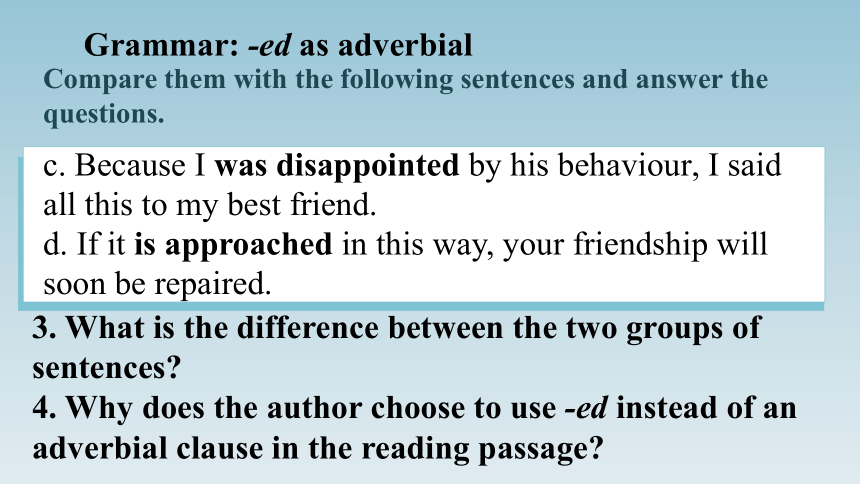
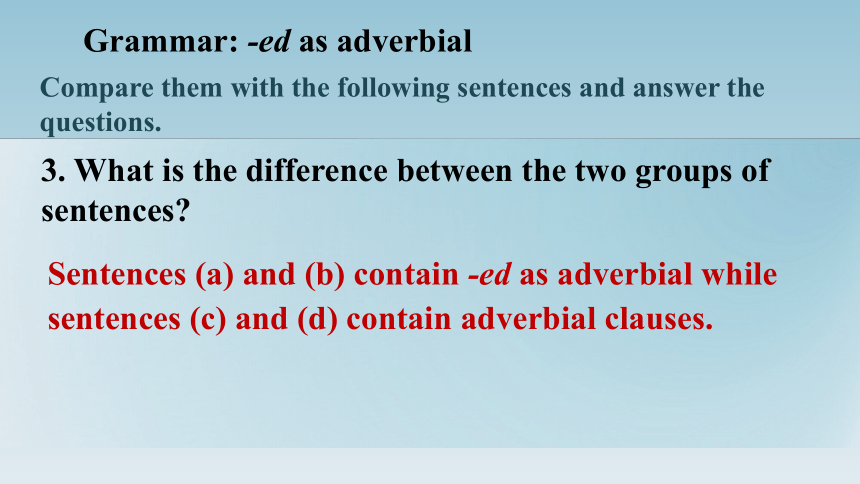
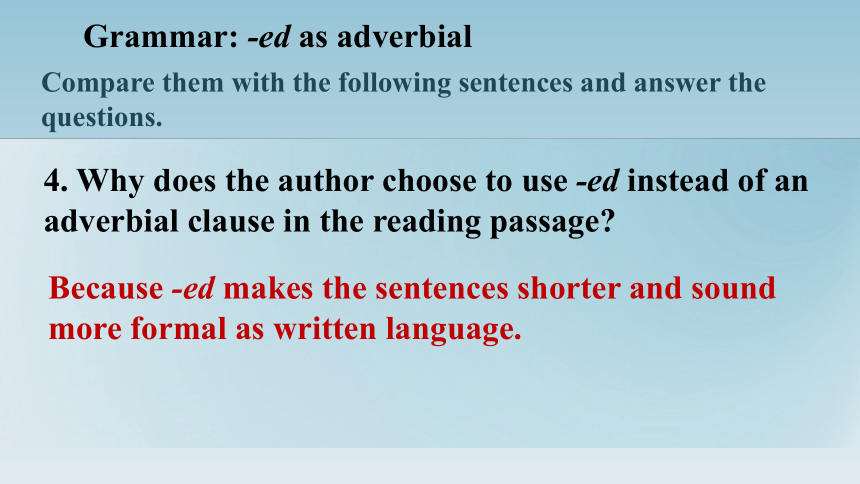
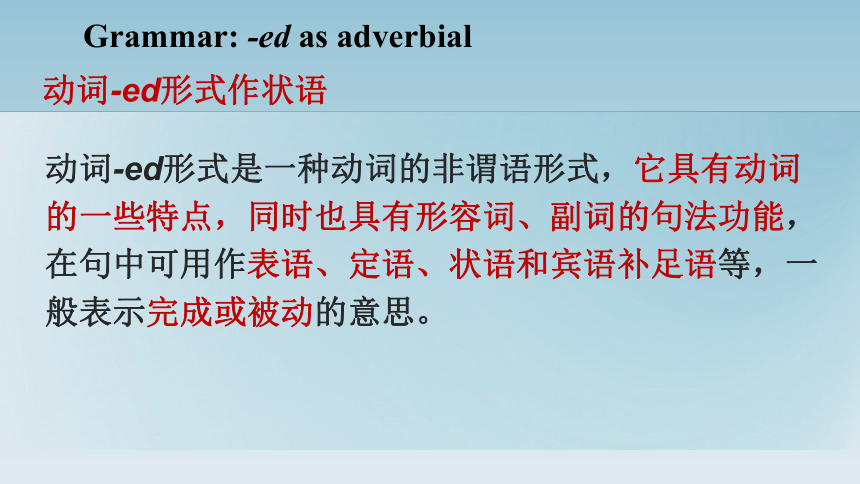
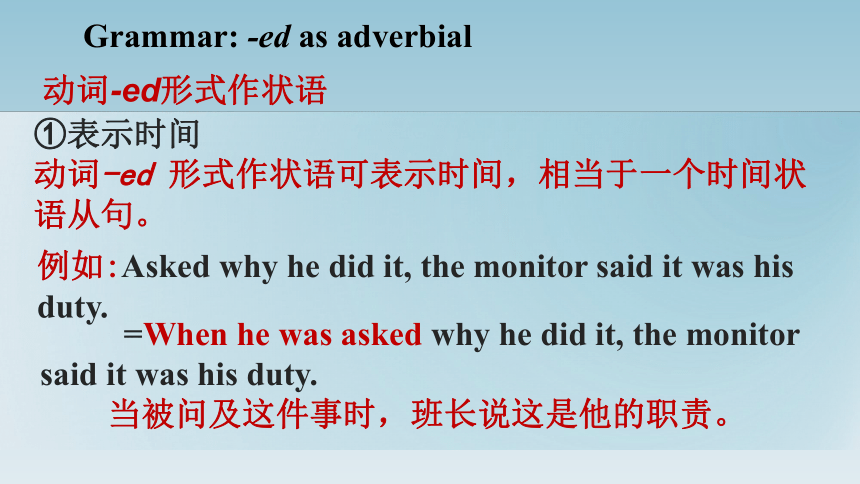
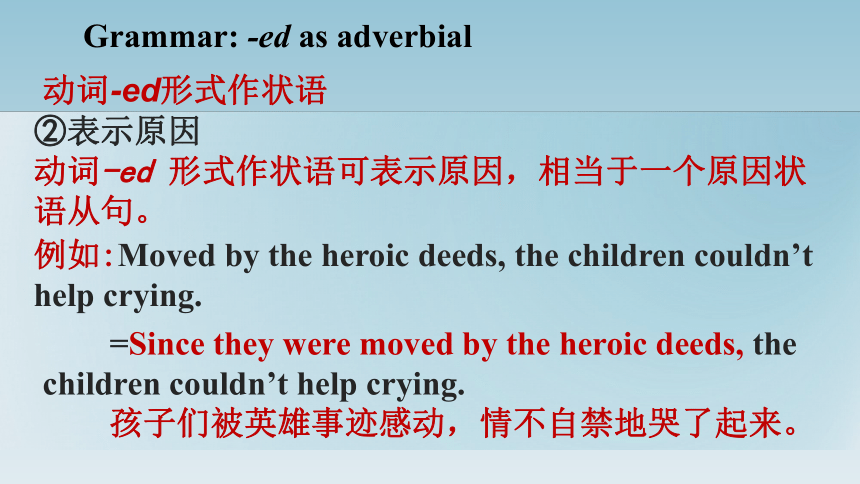
文档简介
(共40张PPT)
Using language
Unit 1 Knowing me, knowing you
目录
contents
Grammar
Vocabulary building
Listening & speaking
Homework
I
II
III
Ⅳ
Grammar
I
Look at the sentences from the reading passage and
answer the questions.
0,000 people reading my blog! b I love to photograph the rising sun, …
a. Disappointed by his behaviour, I said all this to my best friend.
b. Approached in this way, your friendship will soon be repaired.
1. Who was disappointed in sentence (a) What is
approached in sentence (b)
2. Why does the author use -ed instead of -ing here
Grammar: -ed as adverbial
Look at the sentences from the interview and answer the questions.
“I” was disappointed in sentence (a).
“Your friendship” is approached in sentence (b).
1. Who was disappointed in sentence (a) What is
approached in sentence (b)
Grammar: -ed as adverbial
Look at the sentences from the interview and answer the questions.
2. Why does the author use -ed instead of -ing here
Because -ing is used when the action is done by the subject of the sentence, while -ed is used when the action is done to the subject of the sentence. Here, both “disappoint” and “approach” are actions done to the subjects.
Grammar: -ed as adverbial
Compare them with the following sentences and answer the questions.
0,000 people reading my blog! b I love to photograph the rising sun, …
c. Because I was disappointed by his behaviour, I said all this to my best friend.
d. If it is approached in this way, your friendship will
soon be repaired.
3. What is the difference between the two groups of
sentences
4. Why does the author choose to use -ed instead of an
adverbial clause in the reading passage
Grammar: -ed as adverbial
Compare them with the following sentences and answer the questions.
3. What is the difference between the two groups of
sentences
Sentences (a) and (b) contain -ed as adverbial while sentences (c) and (d) contain adverbial clauses.
Grammar: -ed as adverbial
Compare them with the following sentences and answer the questions.
4. Why does the author choose to use -ed instead of an
adverbial clause in the reading passage
Because -ed makes the sentences shorter and sound more formal as written language.
Grammar: -ed as adverbial
动词-ed形式是一种动词的非谓语形式,它具有动词的一些特点,同时也具有形容词、副词的句法功能,在句中可用作表语、定语、状语和宾语补足语等,一般表示完成或被动的意思。
动词-ed形式作状语
Grammar: -ed as adverbial
动词-ed形式作状语
①表示时间
动词-ed 形式作状语可表示时间,相当于一个时间状语从句。
例如:Asked why he did it, the monitor said it was his duty.
Grammar: -ed as adverbial
=When he was asked why he did it, the monitor said it was his duty.
当被问及这件事时,班长说这是他的职责。
②表示原因
动词-ed 形式作状语可表示原因,相当于一个原因状语从句。
Grammar: -ed as adverbial
动词-ed形式作状语
例如:Moved by the heroic deeds, the children couldn’t help crying.
=Since they were moved by the heroic deeds, the children couldn’t help crying.
孩子们被英雄事迹感动,情不自禁地哭了起来。
③表示条件
动词-ed 形式作状语可表示条件,相当与一个条件状语从句。
Grammar: -ed as adverbial
动词-ed形式作状语
例如:Heated, water changes into steam.
= If water is heated, it (water) changes into steam.
水经过加热就变成了蒸汽。
④表示让步
动词-ed 形式作状语可表示让步,相当于一个though / although引导的让步状语从句。
Grammar: -ed as adverbial
动词-ed形式作状语
例如:Exhausted by the running, they went on running after the robber.
= Although they were exhausted by the running, they went on running after the robber.
尽管已经跑得筋疲力尽,他们还是继续追赶着那个强盗。
Rewrite the underlined sentences with the -ed form.
Grammar: -ed as adverbial
Last week, Anne was attracted by a particular article in a magazine, so she bought it. Three days ago, to complete her homework quickly, she copied part of the article without thinking. Her teacher was very satisfied with her homework. Anne was praised in class, and she felt happy as well as ashamed. Then, the teacher wanted to enter her homework into a writing competition. Anne was shocked by the decision and did not know what to do. If she told the truth, the whole class would find out. They would look down on her. If she kept silent, maybe no one would ever find out. ..
What should Anne do
Last week, Anne was attracted by a particular article in a magazine, so she bought it. Three days ago, to complete her homework quickly, she copied part of the article without thinking. Her teacher was very satisfied with her homework. Anne was praised in class, and she felt happy as well as ashamed. Then, the teacher wanted to enter her homework into a writing competition. Anne was shocked by the decision and did not know what to do. If she told the truth, the whole class would find out. They would look down on her. If she kept silent, maybe no one would ever find out. ..
What should Anne do
Last week, attracted by a particular article in a magazine, Anne bought it.
Grammar: -ed as adverbial
Last week, Anne was attracted by a particular article in a magazine, so she bought it. Three days ago, to complete her homework quickly, she copied part of the article without thinking. Her teacher was very satisfied with her homework. Anne was praised in class, and she felt happy as well as ashamed. Then, the teacher wanted to enter her homework into a writing competition. Anne was shocked by the decision and did not know what to do. If she told the truth, the whole class would find out. They would look down on her. If she kept silent, maybe no one would ever find out. ..
What should Anne do
Praised in class, Anne felt happy as well as ashamed.
Grammar: -ed as adverbial
Last week, Anne was attracted by a particular article in a magazine, so she bought it. Three days ago, to complete her homework quickly, she copied part of the article without thinking. Her teacher was very satisfied with her homework. Anne was praised in class, and she felt happy as well as ashamed. Then, the teacher wanted to enter her homework into a writing competition. Anne was shocked by the decision and did not know what to do. If she told the truth, the whole class would find out. They would look down on her. If she kept silent, maybe no one would ever find out. ..
What should Anne do
Shocked by the decision, Anne did not know
what to do.
Grammar: -ed as adverbial
Read the plot summary and choose the correct form of the words.
Inside Out is an animated film about the five emotions of a girl called Riley: Joy, Sadness, Fear, Disgust and Anger. Influencing / Influenced mainly by Joy, most of Riley’s memories are happy ones.
Grammar: -ed as adverbial
Read the plot summary and choose the correct form of the words.
Believing / Believed that she is Riley’s most important emotion, Joy always tries to take the lead. Preventing / Prevented from playing her role in Riley’s emotional development, Sadness feels annoyed. When Riley moves to a new city, she has a hard time adjusting to her new surroundings.
Grammar: -ed as adverbial
Read the plot summary and choose the correct form of the words.
Sadness wants to do her duty but by accident causes the loss of Riley’s happy core memories with Joy. Now separating / separated from her friends and her beloved hockey team, Riley starts to feel lost and helpless, and wants to run away from her parents and new school.
Grammar: -ed as adverbial
Read the plot summary and choose the correct form of the words.
Eventually, realising / realised that every emotion has a role, Joy understands it is okay for Riley to feel sad sometimes. Accepting sadness as part of life helps Riley deal with the emotional complexity of growing up, and settle down in her new life.
Grammar: -ed as adverbial
Vocabulary building
II
Vocabulary building: Interpersonal relationships
Read the tips and underline the words that describe behaviour towards others.
Try to forgive someone
when they apologise. It’s not
easy for anyone to say sorry.
1
It’s not a good idea to
criticise someone in front of
others. This can cause
embarrassment.
2
Vocabulary building: Interpersonal relationships
Read the tips and underline the words that describe behaviour towards others.
It’s important to tell the
truth. Don’t lie.
3
Don’t judge someone too
quickly. It takes time to
understand a person.
4
Don’t always complain
about people. Try to look on
the bright side.
5
Some other tips for happy and healthy relationships
Vocabulary building: Interpersonal relationships
1) It’s a good idea to be generous with others. This can help create a lasting friendship.
2) Try to communicate openly with your friends. Don’t always keep things to yourself.
3) It’s important to laugh. Smiling and laughing will make you and others feel better.
Describe the situations with the words you underlined in the above Activity.
Vocabulary building: Interpersonal relationships
1. I’m really sorry. I didn’t mean it. __________
2. You’re so selfish! __________
3. I know you’re sorry. It’s OK. Don’t worry about
it. __________
4. I can tell he is not easy to get along with. __________
5. I don’t want to wait for him all the time. __________
6. My pet parrot flew away with my homework. ______
apologise
criticise
forgive
judge
complain
lie
Work in pairs. Discuss what you would react in the following situations and explain your reasons.
Vocabulary building: Interpersonal relationships
1. You forgot your best friend’s birthday, and you feel bad about it.
2. Your neighbour always makes a lot of noise late at night. You cannot stand it.
3. Your classmate borrowed a book from you and lost it.
4. Your friends have asked you to watch a boxing match with them, but you don’t like boxing.
Work in pairs. Choose a situation and discuss what you would react and explain your reasons.
Vocabulary building: Interpersonal relationships
Listening & speaking
III
Listening & speaking: Before listening
Did You Know
Emotional quotient (EQ), or emotional intelligence quotient, is a measurement of the ability to recognise one’s own and other people’s emotions.
Listening & speaking: Before listening
Did You Know
It is believed that EQ plays an even more important role than IQ (intelligence quotient) in people’s lives. Being able to say no politely is one of the features of emotional intelligence.
Listening & speaking: While-listening
Listen to three conversations and match them to the pictures.
Conversation3
Conversation 2
Conversation 1
Listening & speaking: While-listening
Listen again and complete the table.
Request Refusal
1 Tina has to leave her flat 1 _____________. She wants to stay at Kerry’s place. Kerry thinks that
2 __________ is too long. Tina is welcome to stay for 3 ____________.
2 Mike invites Ryan to 4 ________________on 5 ________. Ryan cannot come, because he has to 6 __________________
to New York at the weekend.
next week
one month
a few days
come to the party
Saturday
prepare for the trip
Listening & speaking: While-listening
Listen again and complete the table.
Request Refusal
3 Jane would like to see Becky’s 7 ___________ for some ideas. Becky refuses because
she thinks it is better for
Jane to 8 ______________
________________.
project
by herself
do her project
Listening & speaking: While-listening
Now talk about how the speakers make requests and refusals. Listen again if necessary.
If you have to say no to a request, your refusal will sound more polite if you begin with a statement of regret, such as I’m sorry..., I’d really like to, but... Then explain why your answer is no, eg I’m really busy right now. If possible, suggest an alternative — How about next week?
Listening & speaking: Pair work
Work in pairs. Act out the conversation about asking
for a favour and refusing politely.
Student A: Turn to Page 81.
Student B: Turn to Page 84.
Listening & speaking: Pair work
Could I...
Oh you mean, ...
Um not exactly ...
I’m afraid ...
Oh... I’d love to, but I’m...
Oh no ... That’s too bad.
I was just wondering if you could ...
I’m sorry that it just doesn’t feel right. But maybe we can...
Useful Expressions:
Homework
Ⅳ
Homework
1. Summarize the usage of -ed as adverbial;
2. Think of another situation and have a similar conversation.
Using language
Unit 1 Knowing me, knowing you
目录
contents
Grammar
Vocabulary building
Listening & speaking
Homework
I
II
III
Ⅳ
Grammar
I
Look at the sentences from the reading passage and
answer the questions.
0,000 people reading my blog! b I love to photograph the rising sun, …
a. Disappointed by his behaviour, I said all this to my best friend.
b. Approached in this way, your friendship will soon be repaired.
1. Who was disappointed in sentence (a) What is
approached in sentence (b)
2. Why does the author use -ed instead of -ing here
Grammar: -ed as adverbial
Look at the sentences from the interview and answer the questions.
“I” was disappointed in sentence (a).
“Your friendship” is approached in sentence (b).
1. Who was disappointed in sentence (a) What is
approached in sentence (b)
Grammar: -ed as adverbial
Look at the sentences from the interview and answer the questions.
2. Why does the author use -ed instead of -ing here
Because -ing is used when the action is done by the subject of the sentence, while -ed is used when the action is done to the subject of the sentence. Here, both “disappoint” and “approach” are actions done to the subjects.
Grammar: -ed as adverbial
Compare them with the following sentences and answer the questions.
0,000 people reading my blog! b I love to photograph the rising sun, …
c. Because I was disappointed by his behaviour, I said all this to my best friend.
d. If it is approached in this way, your friendship will
soon be repaired.
3. What is the difference between the two groups of
sentences
4. Why does the author choose to use -ed instead of an
adverbial clause in the reading passage
Grammar: -ed as adverbial
Compare them with the following sentences and answer the questions.
3. What is the difference between the two groups of
sentences
Sentences (a) and (b) contain -ed as adverbial while sentences (c) and (d) contain adverbial clauses.
Grammar: -ed as adverbial
Compare them with the following sentences and answer the questions.
4. Why does the author choose to use -ed instead of an
adverbial clause in the reading passage
Because -ed makes the sentences shorter and sound more formal as written language.
Grammar: -ed as adverbial
动词-ed形式是一种动词的非谓语形式,它具有动词的一些特点,同时也具有形容词、副词的句法功能,在句中可用作表语、定语、状语和宾语补足语等,一般表示完成或被动的意思。
动词-ed形式作状语
Grammar: -ed as adverbial
动词-ed形式作状语
①表示时间
动词-ed 形式作状语可表示时间,相当于一个时间状语从句。
例如:Asked why he did it, the monitor said it was his duty.
Grammar: -ed as adverbial
=When he was asked why he did it, the monitor said it was his duty.
当被问及这件事时,班长说这是他的职责。
②表示原因
动词-ed 形式作状语可表示原因,相当于一个原因状语从句。
Grammar: -ed as adverbial
动词-ed形式作状语
例如:Moved by the heroic deeds, the children couldn’t help crying.
=Since they were moved by the heroic deeds, the children couldn’t help crying.
孩子们被英雄事迹感动,情不自禁地哭了起来。
③表示条件
动词-ed 形式作状语可表示条件,相当与一个条件状语从句。
Grammar: -ed as adverbial
动词-ed形式作状语
例如:Heated, water changes into steam.
= If water is heated, it (water) changes into steam.
水经过加热就变成了蒸汽。
④表示让步
动词-ed 形式作状语可表示让步,相当于一个though / although引导的让步状语从句。
Grammar: -ed as adverbial
动词-ed形式作状语
例如:Exhausted by the running, they went on running after the robber.
= Although they were exhausted by the running, they went on running after the robber.
尽管已经跑得筋疲力尽,他们还是继续追赶着那个强盗。
Rewrite the underlined sentences with the -ed form.
Grammar: -ed as adverbial
Last week, Anne was attracted by a particular article in a magazine, so she bought it. Three days ago, to complete her homework quickly, she copied part of the article without thinking. Her teacher was very satisfied with her homework. Anne was praised in class, and she felt happy as well as ashamed. Then, the teacher wanted to enter her homework into a writing competition. Anne was shocked by the decision and did not know what to do. If she told the truth, the whole class would find out. They would look down on her. If she kept silent, maybe no one would ever find out. ..
What should Anne do
Last week, Anne was attracted by a particular article in a magazine, so she bought it. Three days ago, to complete her homework quickly, she copied part of the article without thinking. Her teacher was very satisfied with her homework. Anne was praised in class, and she felt happy as well as ashamed. Then, the teacher wanted to enter her homework into a writing competition. Anne was shocked by the decision and did not know what to do. If she told the truth, the whole class would find out. They would look down on her. If she kept silent, maybe no one would ever find out. ..
What should Anne do
Last week, attracted by a particular article in a magazine, Anne bought it.
Grammar: -ed as adverbial
Last week, Anne was attracted by a particular article in a magazine, so she bought it. Three days ago, to complete her homework quickly, she copied part of the article without thinking. Her teacher was very satisfied with her homework. Anne was praised in class, and she felt happy as well as ashamed. Then, the teacher wanted to enter her homework into a writing competition. Anne was shocked by the decision and did not know what to do. If she told the truth, the whole class would find out. They would look down on her. If she kept silent, maybe no one would ever find out. ..
What should Anne do
Praised in class, Anne felt happy as well as ashamed.
Grammar: -ed as adverbial
Last week, Anne was attracted by a particular article in a magazine, so she bought it. Three days ago, to complete her homework quickly, she copied part of the article without thinking. Her teacher was very satisfied with her homework. Anne was praised in class, and she felt happy as well as ashamed. Then, the teacher wanted to enter her homework into a writing competition. Anne was shocked by the decision and did not know what to do. If she told the truth, the whole class would find out. They would look down on her. If she kept silent, maybe no one would ever find out. ..
What should Anne do
Shocked by the decision, Anne did not know
what to do.
Grammar: -ed as adverbial
Read the plot summary and choose the correct form of the words.
Inside Out is an animated film about the five emotions of a girl called Riley: Joy, Sadness, Fear, Disgust and Anger. Influencing / Influenced mainly by Joy, most of Riley’s memories are happy ones.
Grammar: -ed as adverbial
Read the plot summary and choose the correct form of the words.
Believing / Believed that she is Riley’s most important emotion, Joy always tries to take the lead. Preventing / Prevented from playing her role in Riley’s emotional development, Sadness feels annoyed. When Riley moves to a new city, she has a hard time adjusting to her new surroundings.
Grammar: -ed as adverbial
Read the plot summary and choose the correct form of the words.
Sadness wants to do her duty but by accident causes the loss of Riley’s happy core memories with Joy. Now separating / separated from her friends and her beloved hockey team, Riley starts to feel lost and helpless, and wants to run away from her parents and new school.
Grammar: -ed as adverbial
Read the plot summary and choose the correct form of the words.
Eventually, realising / realised that every emotion has a role, Joy understands it is okay for Riley to feel sad sometimes. Accepting sadness as part of life helps Riley deal with the emotional complexity of growing up, and settle down in her new life.
Grammar: -ed as adverbial
Vocabulary building
II
Vocabulary building: Interpersonal relationships
Read the tips and underline the words that describe behaviour towards others.
Try to forgive someone
when they apologise. It’s not
easy for anyone to say sorry.
1
It’s not a good idea to
criticise someone in front of
others. This can cause
embarrassment.
2
Vocabulary building: Interpersonal relationships
Read the tips and underline the words that describe behaviour towards others.
It’s important to tell the
truth. Don’t lie.
3
Don’t judge someone too
quickly. It takes time to
understand a person.
4
Don’t always complain
about people. Try to look on
the bright side.
5
Some other tips for happy and healthy relationships
Vocabulary building: Interpersonal relationships
1) It’s a good idea to be generous with others. This can help create a lasting friendship.
2) Try to communicate openly with your friends. Don’t always keep things to yourself.
3) It’s important to laugh. Smiling and laughing will make you and others feel better.
Describe the situations with the words you underlined in the above Activity.
Vocabulary building: Interpersonal relationships
1. I’m really sorry. I didn’t mean it. __________
2. You’re so selfish! __________
3. I know you’re sorry. It’s OK. Don’t worry about
it. __________
4. I can tell he is not easy to get along with. __________
5. I don’t want to wait for him all the time. __________
6. My pet parrot flew away with my homework. ______
apologise
criticise
forgive
judge
complain
lie
Work in pairs. Discuss what you would react in the following situations and explain your reasons.
Vocabulary building: Interpersonal relationships
1. You forgot your best friend’s birthday, and you feel bad about it.
2. Your neighbour always makes a lot of noise late at night. You cannot stand it.
3. Your classmate borrowed a book from you and lost it.
4. Your friends have asked you to watch a boxing match with them, but you don’t like boxing.
Work in pairs. Choose a situation and discuss what you would react and explain your reasons.
Vocabulary building: Interpersonal relationships
Listening & speaking
III
Listening & speaking: Before listening
Did You Know
Emotional quotient (EQ), or emotional intelligence quotient, is a measurement of the ability to recognise one’s own and other people’s emotions.
Listening & speaking: Before listening
Did You Know
It is believed that EQ plays an even more important role than IQ (intelligence quotient) in people’s lives. Being able to say no politely is one of the features of emotional intelligence.
Listening & speaking: While-listening
Listen to three conversations and match them to the pictures.
Conversation3
Conversation 2
Conversation 1
Listening & speaking: While-listening
Listen again and complete the table.
Request Refusal
1 Tina has to leave her flat 1 _____________. She wants to stay at Kerry’s place. Kerry thinks that
2 __________ is too long. Tina is welcome to stay for 3 ____________.
2 Mike invites Ryan to 4 ________________on 5 ________. Ryan cannot come, because he has to 6 __________________
to New York at the weekend.
next week
one month
a few days
come to the party
Saturday
prepare for the trip
Listening & speaking: While-listening
Listen again and complete the table.
Request Refusal
3 Jane would like to see Becky’s 7 ___________ for some ideas. Becky refuses because
she thinks it is better for
Jane to 8 ______________
________________.
project
by herself
do her project
Listening & speaking: While-listening
Now talk about how the speakers make requests and refusals. Listen again if necessary.
If you have to say no to a request, your refusal will sound more polite if you begin with a statement of regret, such as I’m sorry..., I’d really like to, but... Then explain why your answer is no, eg I’m really busy right now. If possible, suggest an alternative — How about next week?
Listening & speaking: Pair work
Work in pairs. Act out the conversation about asking
for a favour and refusing politely.
Student A: Turn to Page 81.
Student B: Turn to Page 84.
Listening & speaking: Pair work
Could I...
Oh you mean, ...
Um not exactly ...
I’m afraid ...
Oh... I’d love to, but I’m...
Oh no ... That’s too bad.
I was just wondering if you could ...
I’m sorry that it just doesn’t feel right. But maybe we can...
Useful Expressions:
Homework
Ⅳ
Homework
1. Summarize the usage of -ed as adverbial;
2. Think of another situation and have a similar conversation.
